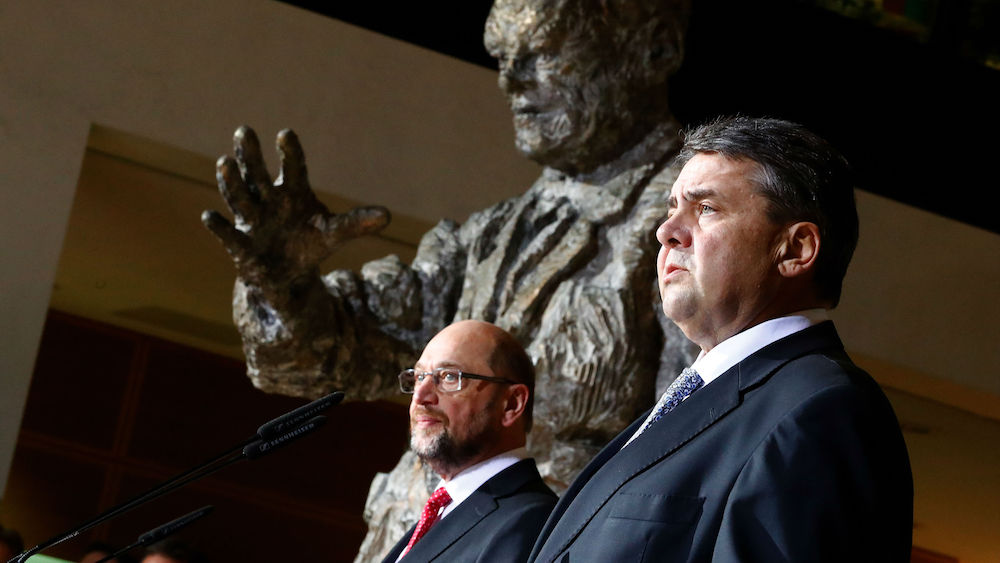In a bombshell move, SPD leader and economy minister Sigmar Gabriel resigned, leaving it to Martin Schulz, the former president of the European Parliament, to compete in the federal elections in September. While Gabriel will become foreign minister, Schulz may turn out to be a trickier opponent for Chancellor Angela Merkel.
Germany’s mercurial Sigmar Gabriel has always been good for a surprise. But the political earthquake he triggered on Tuesday, announcing his resignation as Social Democratic Party (SPD) leader, was the best yet.
Gabriel, the burly party chairman since 2009, said he was throwing in the towel to back ex-European Parliament president Martin Schulz as his successor. This being an election year, that makes Schulz the de facto challenger to Chancellor Angela Merkel in the September federal poll.
The announcement by Gabriel, a 57-year-old political veteran and economy minister in the Merkel government, caught even close allies by surprise. They knew an announcement was coming in the next days, but Gabriel tore up his own timetable with the painfully self-critical comment that he viewed himself as more of a liability than an asset to his party.
“If I ran then I would fail and, with me, the SPD,” he said. “The party has to believe in its candidate and gather behind them.”
After mulling his future for six months, Gabriel’s last act was to commission a private poll of SPD members. The result: the 61-year-old Schulz was by far their preference to try and hinder a fourth Merkel term.
Gabriel, in comparison, has long been viewed as an unpredictable figure, as unpopular inside his party as among the wider public. Just 19 percent of voters backed him to challenge Merkel in a public television poll last month, compared to 36 percent for Schulz.
Gabriel isn’t disappearing: he wants to switch from economics to foreign affairs, succeeding Frank-Walter Steinmeier, who will become Germany’s president in the next few weeks. That raises fresh questions about German diplomacy at a delicate time – given tensions with Russia and Donald Trump’s United States – between now and September.
“Bull in a China Shop”
“He’s not a born diplomat, more a bull in a china shop,” said Daniel Friedrich Sturm, a Gabriel biographer. “He’ll push a different style but, with the rise of Trump and the right-wing populism in Europe, everything is being mixed up anyway. It’ll be interesting to see how things develop.”
A protégé of ex-chancellor Gerhard Schröder, Gabriel failed to resolve tensions between the SPD’s leftist and centrist wings and provide resolution to the party’s lingering ambiguous relationship to the Schröder-era economic and social reforms.
An added challenge in the second grand coalition under Merkel: voters’ refusal of voters to reward him for delivering on core campaign promises such as a minimum wage. “Because the numbers didn’t go up, he decided the person most likely to win should run,” said Johannes Kahrs, a leading centrist SPD figure.
The task of reviving – and uniting – the SPD now falls to Schulz, who grew up in a mining family in the western state of North Rhine-Westphalia and has had several stations in his life: bookseller, alcoholic, local mayor, and, since 1994, a member of the European parliament. For the last five years, he was EU Parliament president, boosting the profile of the institution like none of his predecessors.
But apart from being a dyed-in-the-wool European, lifelong Social Democrat, and permanent German talk show guest, nobody knows much about how he will position himself in a domestic political scene in which, until now, he was always an outside observer.
“He has to position himself – on social policy, security policy, all domestic policy – on an ad hoc basis, and in just eight months,” said Volker Kronenburg, a professor for political science at the University of Bonn.
Aware that he has a lot to do in the coming months, Schulz will not, as previously speculated, join Merkel’s cabinet. Rather, he will concentrate on the campaign and the party, which is flat-lining at historic lows of around 20 percent in polls, around 13 points behind Merkel’s Christian Democratic Union (CDU).
Back to the Roots?
In his first remarks, Schulz promised a back-to-the-roots campaign, taking on Merkel, populism, and growing social divisions with classic social democratic politics of social justice. “The SPD has a claim on this theme,” he told party MPs on Wednesday, who greeted him with a standing ovation, hopeful the new arrival can restart the party and reboot its political fortunes after years adrift.
“Many people are turning away from Merkel and are asking what the SPD has on offer,” said deputy leader Manuela Schwesig. “Martin Schulz stands for the European idea and solidarity. I think he can reach people’s hearts because he stands for a new start and has a high level of credibility.”
The biggest question thrown up by Gabriel’s departure and Schulz’s arrival is whether the surprise move makes Merkel’s life more difficult as she seeks re-election next September – and, if so, how.
After three terms, including two grand coalitions with the SPD, no one in her government relishes the thought of a return of the current setup. But there may be no other realistic option, given slumping support for the mainstream parties and the complicated arithmetic resulting from the likely arrival of two more parties in the next Bundestag – the right-wing populist Alternative für Deutschland (AfD) and the returning Liberal Democrats (FDP).
Schulz is the fifth SPD leader to face Merkel in her time at the helm of the CDU and, while he is unlikely to overtake the CDU in polls, he could prove a wild card in Germany’s election campaign.
“He’s never had government power and very little domestic political experience,” said Jürgen Falter, professor for political science at the Johannes Gutenberg University in Mainz. “But he is more of a fighter with the common touch, so Angela Merkel will have to take him seriously as a campaigner.







